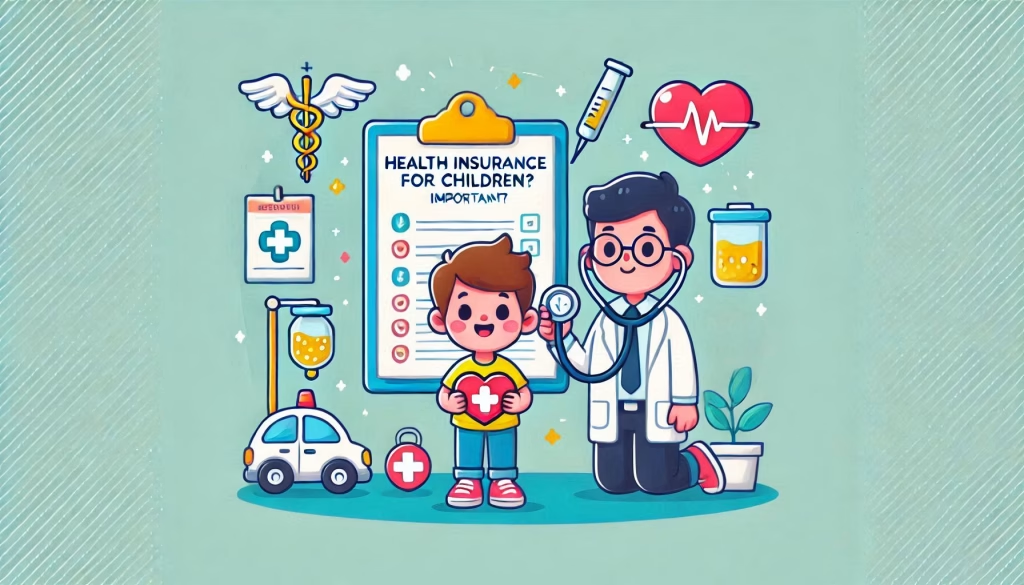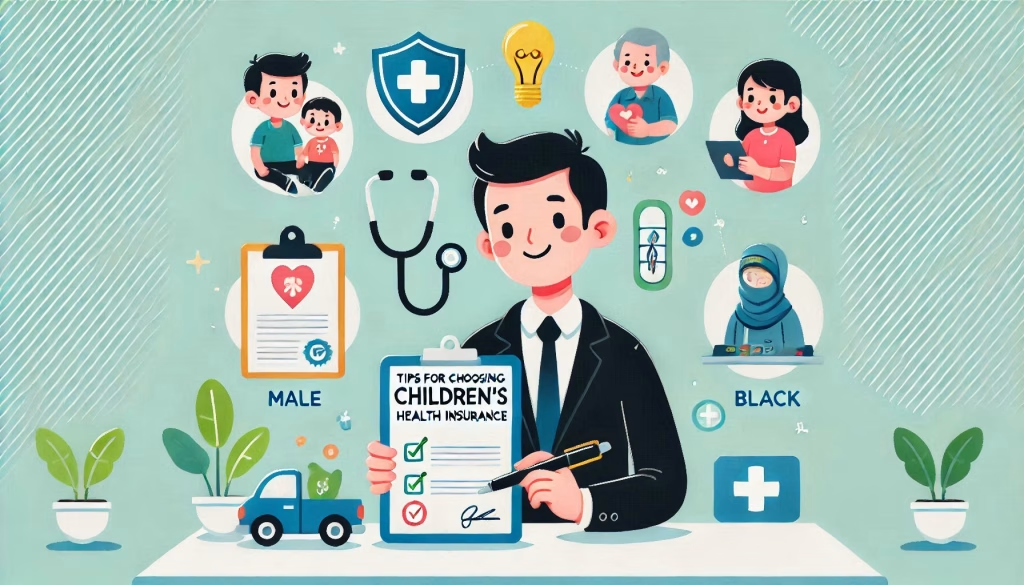Table of Contents
- Overview
- Why is Health Insurance for Children Important?
- Child Health Insurance Premiums
- What Are Health Insurance Premiums?
- Factors Influencing Child Health Insurance Premiums
- Tips for Managing Child Health Insurance Premiums
- Tips for Choosing Children’s Health Insurance
- Assess Your Child’s Healthcare Needs
- Compare Different Plans
- Check Network Providers
- Review Coverage Limits and Exclusions
- Consider Government Programs
- Evaluate Premiums and Out-of-Pocket Costs
- Look for Additional Benefits
- Understand the Claim Process
- Seek Professional Advice
- Review and Update Coverage Regularly
- Consider the Reputation of the Insurance Company
- Take Advantage of Preventive Care
- Maintain a Healthy Lifestyle
- Plan for the Future
- The Conclusion
Overview
Every parent undoubtedly strives to provide the best for their child. All efforts are made to ensure children have a good life, both presently and in the future. Regardless of the cost, if it benefits the child, it will certainly be pursued.
Similarly, for future security, parents often plan well in advance. This is to shield their children from potential hardships. For instance, securing health insurance for children is one such preparatory measure.
This insurance provides parents with a safeguard for their children’s future health. Thus, if a child becomes sick and requires medical care, the parents can be at ease about the expenses, as these will be covered by the insurance company.
To mitigate financial risksRisk Risk is a loss that occurs to the insured individual or object. Various bad possibilities could happen to someone., selecting the appropriate health insurance is crucial. This ensures that the benefits can be fully utilized. To avoid errors in choosing health insurance for children, consider the following tips.
Why is Health Insurance for Children Important?

Health insurance for children is crucial as it covers a wide range of medical needs, from hospitalizations and vaccinations to regular check-ups, ensuring both immediate treatment for illnesses and injuries, as well as ongoing health monitoring as the child grows. It provides financial security against the rising costs of healthcare and supports the child’s physical and educational well-being by minimizing school absences due to health issues.
Health insurance is a critical component of ensuring the well-being and future of children. It provides access to necessary medical care, preventive services, and financial protection against unexpected health expenses. Understanding the importance of health insurance for children can help parents make informed decisions about their child’s health and financial security.
This article explores the key reasons why health insurance for children is essential and offers practical tips for securing the best coverage.
Why is Health Insurance for Children Important? No.1
InsuranceWhat.com
Access to Preventive Care
One of the primary benefits of health insurance for children is access to preventive care. Regular check-ups, vaccinations, and screenings are crucial for monitoring a child’s growth and development. Preventive care helps identify potential health issues early, allowing for timely intervention and treatment. Health insurance ensures that children receive these essential services without the financial burden, promoting overall health and well-being.
Why is Health Insurance for Children Important? No.2
InsuranceWhat.com
Early Detection and Treatment
Health insurance enables early detection and treatment of illnesses and medical conditions. Children are susceptible to various health issues, from common colds to chronic diseases. With health insurance, parents can seek medical attention promptly, reducing the riskRisk Risk is a loss that occurs to the insured individual or object. Various bad possibilities could happen to someone. of complications and improving outcomes. Early treatment can prevent minorMinor Policyholders who are under 21 years of age. health problems from becoming severe, ensuring that children lead healthy and active lives.
Why is Health Insurance for Children Important? No.3
InsuranceWhat.com
Financial Protection
Medical expenses can be overwhelming, especially for families with limited financial resources. Health insurance provides financial protection by covering a significant portion of medical costs, including doctor visits, hospital stays, medications, and surgeries. This financial support allows parents to focus on their child’s health without worrying about the economic impact of medical bills. Health insurance also helps families avoid debt and financial hardship due to unexpected health expenses.
Why is Health Insurance for Children Important? No.4
InsuranceWhat.com
Comprehensive Coverage
Health insurance plans for children typically offer comprehensive coverage, including a wide range of medical services. These plans cover essential health benefits such as pediatric care, dental and vision services, mental health support, and prescription medications. Comprehensive coverage ensures that children receive holistic care, addressing all aspects of their health and development.
Why is Health Insurance for Children Important? No.5
InsuranceWhat.com
Improved Health Outcomes
Studies have shown that children with health insurance have better health outcomes compared to those without coverage. InsuredInsured A person who is legally listed in the insurance policy to receive benefits from the policy. A person whose life/health is covered in accordance with an insurance agreement or contract. children are more likely to receive timely medical care, adhere to treatment plans, and experience fewer hospitalizations. Health insurance promotes regular medical visits, which are essential for managing chronic conditions and preventing complications. By ensuring access to quality healthcare, health insurance contributes to improved health outcomes for children.
Why is Health Insurance for Children Important? No.6
InsuranceWhat.com
Peace of Mind for Parents
Knowing that their child has health insurance provides parents with peace of mind. It alleviates the stress and anxiety associated with potential medical emergencies and the financial burden of healthcare costs. Parents can rest assured that their child will receive the necessary medical attention and care, regardless of their financial situation. This peace of mind allows parents to focus on other aspects of their child’s well-being and development.
Why is Health Insurance for Children Important? No.7
InsuranceWhat.com
Legal Requirements
In many countries, health insurance for children is a legal requirement. Governments recognize the importance of ensuring that all children have access to healthcare services. Mandatory health insurance policiesInsurance policy An agreement between the policyholder and the insurance company to perform the obligations as agreed by both parties. aim to reduce disparities in healthcare access and promote the health and well-being of all children. By complying with legal requirements, parents can avoid penalties and ensure that their child receives the necessary medical care.
Why is Health Insurance for Children Important? No.8
InsuranceWhat.com
Children are More Vulnerable to Diseases
The assumption that children are healthier than adults is not entirely accurate. Under certain conditions, children may be more vulnerable to illnesses due to their still-developing immune systems, in contrast to adults whose immune systems are fully developed.
Therefore, children’s health insurance is crucial to prepare for unexpected illnesses. This insurance greatly assists parents with treatment expenses and medication costs.
Child Health Insurance PremiumsPremium The money that must be paid at a certain time is the obligation of the insurance policyholder. The amount of premium paid is determined by the policy and approval of the insurance company in accordance with the conditions of the insured. The nominal payment approved by policyholders and insurance companies. Premium payment will be made according to the agreement, it can be monthly, yearly, or according to the agreement.

Health insurance for children is a crucial aspect of ensuring their well-being and providing financial protection for families. Understanding how premiums are determined and what factors influence them can help parents make informed decisions when selecting a health insurance plan for their children. This article will explore the key elements that affect child health insurance premiums and offer practical tips for managing these costs.
What Are Health Insurance Premiums?

Health insurance premiums are the monthly payments that policyholders make to maintain their health insurance coverage. These payments ensure that the insuredInsured A person who is legally listed in the insurance policy to receive benefits from the policy. A person whose life/health is covered in accordance with an insurance agreement or contract. individuals have access to medical services and financial protection against healthcare expenses. For children, health insurance premiums can vary based on several factors, including the child’s health history, the benefits selected, and the coverage period.
Factors Influencing Child Health Insurance Premiums

Several factors can influence the cost of health insurance premiums for children. Understanding these factors can help parents choose the most suitable and cost-effective plan for their family’s needs.
Child Health Insurance Premiums No.1
InsuranceWhat.com
Health History
A child’s health history plays a significant role in determining the cost of health insurance premiums. If a child has a history of medical conditions or chronic illnesses, the premiums may be higher to account for the increased risk of healthcare expenses. Conversely, if a child is generally healthy with no significant medical history, the premiums may be lower. Insurance companies assess the risk associated with insuring a child based on their health history and adjust the premiums accordingly.
Child Health Insurance Premiums No.2
InsuranceWhat.com
Selected Benefits
The benefits included in a health insurance plan can also impact the cost of premiums. Plans that offer comprehensive coverage, including preventive care, dental and vision services, and mental health support, may have higher premiums compared to basic plans with limited benefits. Parents should carefully consider the benefits they need for their child and choose a plan that provides adequate coverage without unnecessary extras that could increase the cost.
Child Health Insurance Premiums No.3
InsuranceWhat.com
Coverage Period
The length of the coverage period can affect the cost of health insurance premiums. Plans that provide coverage from infancy through adulthood may have higher premiums due to the extended period of coverage. On the other hand, plans with shorter coverage periods, such as those that cover only a few years, may have lower premiums. Parents should evaluate their long-term needs and choose a coverage period that aligns with their financial goals and the child’s healthcare requirements.
Child Health Insurance Premiums No.4
InsuranceWhat.com
Geographic Location
The geographic location of the policyholder can influence health insurance premiums. Healthcare costs and insurance regulations can vary significantly between regions, affecting the overall cost of premiums. For example, areas with higher healthcare costs or stricter insurance regulations may have higher premiums compared to regions with lower costs and more lenient regulations. Parents should consider the impact of their location on health insurance premiums when selecting a plan.
Child Health Insurance Premiums No.5
InsuranceWhat.com
Age of the Child
The age of the child is another factor that can affect health insurance premiums. Younger children may have lower premiums due to their generally lower healthcare needs, while older children and teenagers may have higher premiums as they approach adulthood. Insurance companies consider the age-related risk of healthcare expenses when determining premiums, so parents should be aware of how their child’s age may impact the cost of coverage.
Tips for Managing Child Health Insurance Premiums

While health insurance premiums are an essential expense, there are several strategies that parents can use to manage and potentially reduce these costs. Here are some practical tips for managing child health insurance premiums:
Tips for Child Health Insurance Premiums No.1
InsuranceWhat.com
Compare Different Plans
One of the most effective ways to manage health insurance premiums is to compare different plans from various insurance providers. By evaluating the benefits, coverage options, and costs of multiple plans, parents can identify the most cost-effective option that meets their child’s healthcare needs. Online comparison tools and insurance brokers can be valuable resources for finding and comparing health insurance plans.
Tips for Child Health Insurance Premiums No.2
InsuranceWhat.com
Choose a High-Deductible Plan
High-deductible health insurance plans typically have lower monthly premiums compared to plans with lower deductibles. While these plans require policyholders to pay more out-of-pocket expenses before the insurance coverage kicks in, they can be a cost-effective option for families with generally healthy children who do not require frequent medical care. Parents should weigh the potential savings on premiums against the higher out-of-pocket costs to determine if a high-deductible plan is suitable for their situation.
Tips for Child Health Insurance Premiums No.3
InsuranceWhat.com
Take Advantage of Preventive Care
Many health insurance plans offer free or low-cost preventive care services, such as vaccinations, wellness check-ups, and screenings. Utilizing these services can help parents manage their child’s health and prevent more serious and costly medical issues in the future. By focusing on preventive care, families can reduce the overall healthcare expenses and potentially lower their insurance premiums over time.
Tips for Child Health Insurance Premiums No.4
InsuranceWhat.com
Maintain a Healthy Lifestyle
Encouraging and maintaining a healthy lifestyle for children can positively impact health insurance premiums. Healthy habits, such as regular exercise, a balanced diet, and routine medical check-ups, can reduce the risk of chronic illnesses and medical conditions. Insurance companies may offer lower premiums for children with a healthy lifestyle, as they present a lower risk of healthcare expenses.
Tips for Child Health Insurance Premiums No.5
InsuranceWhat.com
Review and Update Coverage Regularly
As children grow and their healthcare needs change, it is essential for parents to review and update their health insurance coverage regularly. Adjusting the coverage to match the child’s current needs can help avoid paying for unnecessary benefits and reduce premiums. Parents should also stay informed about any changes in insurance regulations or available plans that could impact their coverage options and costs.
Tips for Child Health Insurance Premiums No.6
InsuranceWhat.com
Consider Government Programs
For families with limited financial resources, government programs such as Medicaid and the Children’s Health Insurance Program (CHIP) can provide affordable health insurance coverage for children. These programs offer comprehensive benefits at reduced or no cost, ensuring that all children have access to necessary healthcare services. Parents should explore their eligibility for these programs and take advantage of the financial assistance they provide.
Tips for Choosing Children’s Health Insurance

Choosing the right health insurance for your children is a crucial decision that can significantly impact their well-being and your family’s financial stability. With numerous options available, it’s essential to understand the key factors to consider when selecting a health insurance plan for your children. This article provides comprehensive tips to help you make an informed decision and ensure that your children receive the best possible healthcare coverage.
Choosing Children’s Health Insurance No.1
InsuranceWhat.com
Assess Your Child’s Healthcare Needs
Before selecting a health insurance plan, it’s important to assess your child’s healthcare needs. Consider factors such as age, medical history, and any existing health conditions. Understanding your child’s specific needs will help you choose a plan that provides comprehensive coverage and addresses all aspects of their health. For example, if your child has a chronic condition, you may need a plan that offers specialized care and medications.
Choosing Children’s Health Insurance No.2
InsuranceWhat.com
Compare Different Plans
Take the time to compare different health insurance plans available in your area. Look for plans that offer comprehensive coverage, including preventive care, pediatric services, dental and vision care, and mental health support. Compare premiums, deductibles, co-pays, and out-of-pocket maximums to find a plan that fits your budget and provides the best value. Online comparison tools and insurance brokers can be valuable resources for finding and comparing health insurance plans.
Choosing Children’s Health Insurance No.3
InsuranceWhat.com
Check Network Providers
Ensure that the health insurance plan you choose includes a network of reputable healthcare providers. Check if your child’s current pediatrician and specialists are in-network, as this will help you avoid additional costs. Access to a wide network of providers ensures that your child receives quality care from trusted professionals. Additionally, consider the convenience of the providers’ locations and their availability for appointments.
Choosing Children’s Health Insurance No.4
InsuranceWhat.com
Review Coverage Limits and Exclusions
Carefully review the coverage limits and exclusions of each health insurance plan. Some plans may have limitations on certain services or exclude specific treatments. Make sure the plan you choose covers all essential health benefits and does not have restrictive exclusions that could impact your child’s care. For example, check if the plan covers emergency care, hospital stays, prescription medications, and specialized treatments.
Choosing Children’s Health Insurance No.5
InsuranceWhat.com
Consider Government Programs
If you have limited financial resources, explore government programs that provide health insurance for children. Programs such as Medicaid and the Children’s Health Insurance Program (CHIP) offer affordable coverage for low-income families. These programs ensure that all children have access to necessary healthcare services, regardless of their family’s financial situation. Eligibility criteria and benefits may vary by state, so check the specific requirements in your area.
Choosing Children’s Health Insurance No.6
InsuranceWhat.com
Evaluate Premiums and Out-of-Pocket Costs
When choosing a health insurance plan, it’s essential to evaluate both the premiums and out-of-pocket costs. Premiums are the monthly payments you make to maintain coverage, while out-of-pocket costs include deductibles, co-pays, and co-insurance. Consider your budget and determine how much you can afford to pay in premiums and out-of-pocket expenses. A plan with lower premiums may have higher out-of-pocket costs, so find a balance that works for your financial situation.
Choosing Children’s Health Insurance No.7
InsuranceWhat.com
Look for Additional Benefits
Some health insurance plans offer additional benefits that can enhance your child’s healthcare experience. These benefits may include wellness programs, telehealth services, and discounts on gym memberships or health-related products. Consider these extra perks when comparing plans, as they can provide added value and support your child’s overall health and well-being.
Choosing Children’s Health Insurance No.8
InsuranceWhat.com
Understand the ClaimClaim The demands are given by the insurance policyholder to get the right properly so that the insurer pays the conditions according to the existing procedure. Process
Before selecting a health insurance plan, familiarize yourself with the claim process. Understand how to file a claim, what documentation is required, and the timeline for reimbursement. A straightforward and efficient claim process can save you time and reduce stress when seeking reimbursement for medical expenses. Additionally, check if the insurance company offers online tools or mobile apps to manage claimsClaim The demands are given by the insurance policyholder to get the right properly so that the insurer pays the conditions according to the existing procedure. and track expenses.
Choosing Children’s Health Insurance No.9
InsuranceWhat.com
Seek Professional Advice
If you’re unsure about which health insurance plan to choose, consider seeking advice from a licensed insurance agentAgent People who work and are tied to insurance companies to find and serve policyholders. Insurance company employees who are tasked with marketing products or serving prospective customers, starting from submitting the policy provisions to the contents of the policy agreement after becoming a policyholder. or financial advisor. These professionals can help you navigate the complexities of health insurance and find a plan that meets your child’s needs and your budget. They can also provide valuable insights into the benefits and limitations of different plans, helping you make an informed decision.
Choosing Children’s Health Insurance No.10
InsuranceWhat.com
Review and Update Coverage Regularly
As your child grows and their healthcare needs change, it’s essential to review and update your health insurance coverage regularly. Adjusting the coverage to match your child’s current needs can help avoid paying for unnecessary benefits and reduce premiums. Stay informed about any changes in insurance regulations or available plans that could impact your coverage options and costs.
Choosing Children’s Health Insurance No.11
InsuranceWhat.com
Consider the Reputation of the Insurance Company
The reputation of the insurance company is another crucial factor to consider. A reputable insurerInsurer A person who is legally listed in the insurance policy to make premium payments for that policy. will provide transparent terms, fair pricing, and excellent customer service. Research potential insurersInsurer A person who is legally listed in the insurance policy to make premium payments for that policy. by reading online reviews, checking their ratings with the Better Business Bureau, and seeking recommendations from friends or family. Avoid insurers with a history of customer complaints, hidden fees, or poor service.
Choosing Children’s Health Insurance No.12
InsuranceWhat.com
Take Advantage of Preventive Care
Many health insurance plans offer free or low-cost preventive care services, such as vaccinations, wellness check-ups, and screenings. Utilizing these services can help manage your child’s health and prevent more serious and costly medical issues in the future. Preventive care is essential for monitoring your child’s growth and development and ensuring they receive timely medical attention.
Choosing Children’s Health Insurance No.13
InsuranceWhat.com
Maintain a Healthy Lifestyle
Encouraging and maintaining a healthy lifestyle for your child can positively impact health insurance premiums and overall well-being. Healthy habits, such as regular exercise, a balanced diet, and routine medical check-ups, can reduce the risk of chronic illnesses and medical conditions. Insurance companies may offer lower premiums for children with a healthy lifestyle, as they present a lower risk of healthcare expenses.
Choosing Children’s Health Insurance No.14
InsuranceWhat.com
Plan for the Future
When choosing a health insurance plan, consider your long-term financial goals and how the plan fits into your overall financial plan. Think about how the plan will impact your future finances and whether it aligns with your goals, such as saving for college or buying a home. By planning for the future, you can make more informed decisions and ensure that the health insurance plan supports your financial objectives.
The Conclusion
Providing Children with Health Insurance for Future Medical Needs
Choosing the right health insurance for your children is a critical decision that requires careful consideration and research. By assessing your child’s healthcare needs, comparing different plans, checking network providers, and evaluating premiums and out-of-pocket costs, you can find a plan that provides comprehensive coverage and fits your budget. Additionally, consider government programs, seek professional advice, and review coverage regularly to ensure that your child receives the best possible healthcare. With the right health insurance plan, you can ensure that your child receives the care they need to thrive and lead a healthy, happy life.
Do you think you have other ideas about Protecting Your Child’s Health: Top Health Insurance Tips? You can comment and share your thoughts below, or discuss more in the InsuranceWhat Forum. Also, read more articles about GLOBAL INSURANCE or other interesting insurance topic articles only at InsuranceWhat.com.





